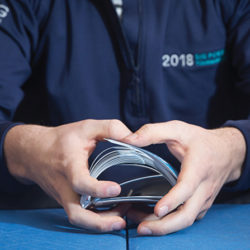
Here is the situation: At a nine handed NL Holdem Table, you are holding (A♦ T♦) in the Big Blind (BB) and you choose to call a pre-flop raise from a player who opened under the gun (UTG). The flop comes (K♦ 7
♥ 4♦), giving you the nut flush draw. Your opponent puts in a standard bet of a little more than half the size of the pot, which you choose to call. There are now 14 BB in the pot. The turn comes a 2♠, unlikely to hit either of your hands. You check again, and your opponent now places a 7 BB bet into the pot. If you call, you would be left with 13 BBs in your stack.
What should you do?
For those of you who say you should fold, you are probably correctly identifying the immediate odds. A flush will come on the river 19.56% of the time and your immediate odds imply that you need to be 25% to win to justify calling 7 BB to win 21 BB.
For those of you who say you should call, you are probably correctly identifying the future implied odds. This is an advanced concept that includes the expectation that you will win further chips on the river if you hit your flush. In this case, you would need to make at least 9 BB on average on the river for it to be profitable to call the turn. In most games, I think this is probably true. The caveat is that your opponent may hold KK, in which case 2/9 of your nut flush cards would give him a full house. As long as you are aware of this, you can call and proceed with caution.
My answer is to neither call nor fold. And no, I definitely would not raise here. My answer to this question is that I do not yet know the answer. I need more information, and there is one question in particular I need answered: Are you playing a tournament or a cash game?
When you are playing a cash game, you have the luxury of purely making positive expectancy decisions. Therefore, it is a fairly easy decision, and your choice should be to call, given the future implied odds. In this situation, your opponent likely has a strong holding that will be forced to pay you off on the river. If you miss your flush, you simply rebuy and keep playing.
When you are playing a tournament, however, you can no longer make decisions based purely on positive expectancy. Now, there is another element added to the decision making process: bankroll management. If you are in a tournament, is it still worth making the same call? The thing to remember here is that if you lose all of your chips, you are out of the tournament! If you are playing sound poker, you should fold* here and choose to keep your 20 BBs and use those chips to put yourself in a better situation in the near future. You can expect that the value of your future decisions will exceed the very slim value of this call.
In poker, it is important to always be thinking about every little detail when you breakdown your decision making process. Subtle changes in context may have dramatic implications for how you proceed with the hand.
*You should fold to maximize your chances of winning the tournament. If you have access to a cash game where your hourly EV is similar, you should call and then go play the cash game if you lose the hand.




Subscribe Now
Get each new post sent straight to your inbox